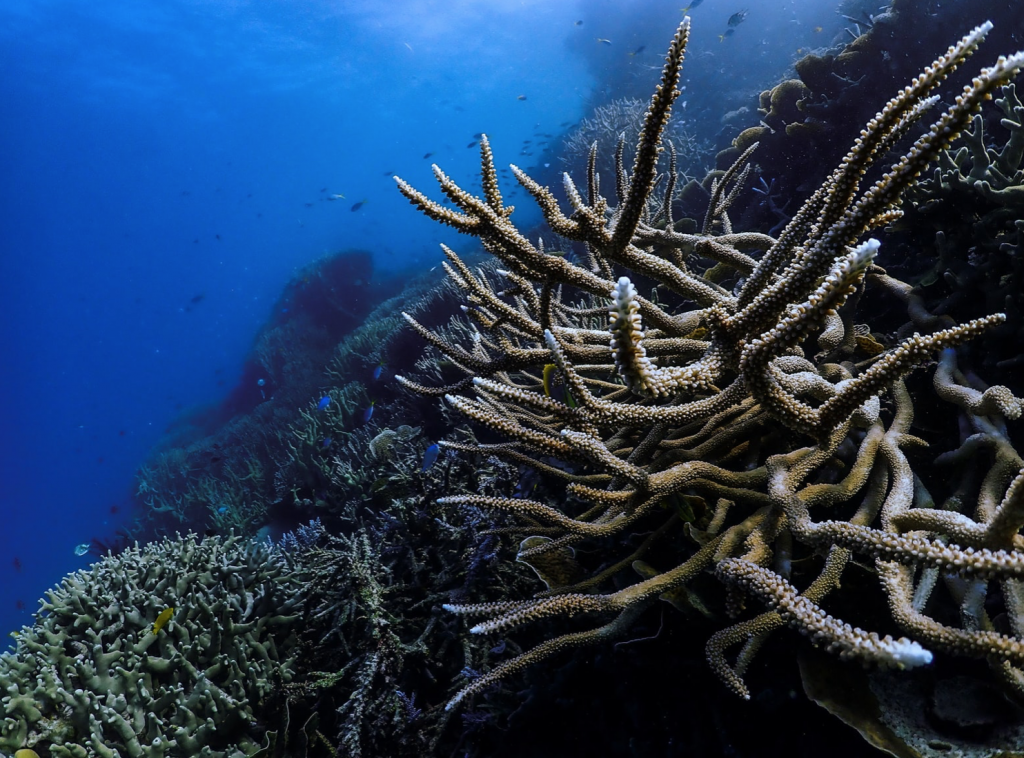By: Cassandra Baird
Our newly “normal” world is composed of human-influenced loss. There are treasures deep within our natural world which are slowly regressing into extinction before our eyes, providing us with an increasing speculative perspective as to what will be preserved of it for future generations. The Great Barrier Reef in Australia has already been harmed by climate change, as it is already experiencing serious complications which spark discussion as to its future preservation. The reef stretches “1,429 miles over an area of approximately 133,000 square miles located off the coast of Queensland”, with it being one of the most diverse ecosystems in the world by homing numerous species of marine life and bringing in enormous funds through marine tourism. When we consider the already fragile nature of the reef, the confirmed statistical data of reef damage, alongside the neoliberal discourse which affects our current society’s environmental sustainability practices, it is certainly fair to speculate that the Great Barrier Reef will be lost in the future if changes are not made quickly and efficiently.
So…what exactly has happened?
The three main impacts of climate change on the reef are: coral bleaching, ocean acidification, and rising sea levels.
Coral Bleaching
Coral bleaching is a process during summer months which occurs when the reefs experience abnormally high sea-surface temperatures. According to Coral Reef Studies, corals inhabiting tropical coral reefs are thermally sensitive, which means that they can only tolerate small temperature changes. There have been multiple large-scale bleaching events which were deemed as catastrophic to the GBR, as they subjected the reefs to irreversible damage, those of which were recorded to take place within the summers of 1998, 2002, and most recently in 2016. Studies have indicated that a 1°C increase in the temperature would increase the bleaching occurrence of reefs from 50% (approximate occurrence in 1998 and 2002) to 82%, while a 2°C increase would increase the occurrence to 97% and a 3°C increase to 100%”. With this, we can understand how fragile the reefs are prior to any of the bleaching events, and resultedly how devastating any further damage will be to the long-term future of the reefs.
Ocean Acidification
The reefs have also suffered as a result of ocean acidification, which is described as when CO2 is absorbed by seawater and a series of chemical reactions occur resulting in the increased concentration of hydrogen ions. This ultimately causes the seawater to become more acidic and causes carbonate ions to be relatively less abundant, as carbonate ions are an important building block of coral skeletons. Furthermore, it was explained in a study that approximately 25% of the CO2 emitted by humans in the period 2000 to 2006 was emitted into the oceans, where it combined with water to produce carbonic acid which releases a proton that combines with a carbonate ion.
Rising Sea Levels
Lastly, rising sea levels are the most prominently discussed concept regarding GBR damage. According to the GBRMPA, sea-level rise is caused by thermal expansion (ocean water warming and expanding) and the melting of ice sheets from glaciers, land-based ice, ice sheets, and sea ice. Tropical sea-surface temperatures have risen by 0.4–0.5°C since the late 19th century, as it is noted that “rapid, human-induced climate change” stands as the greatest overall threat to the future of the GBR. Sea levels on the GBR specifically have risen 3mm per year since 1991, with the rate of increase are shown to be accelerating (with records of sea levels at Cape Ferguson near Townsville showing an average increase of 2.9mm every year between 1991 and 2006. Ultimately, these increases reflect the severity of damage which has occurred, as these effects make the reefs increasingly vulnerable to damage and places them at risk because of inability for the coral to regenerate itself from the irreparable damage.
Why do coral reefs matter?
After understanding the damages suffered by the Great Barrier Reef, this ultimately raises several questions: “why do coral reefs matter to our ecosystems?” and “why does it matter if they were go to extinct?”. With this, we can look at an informative video from the World Economic Forum, which explains specifically what kind of impact coral reefs have on our ecosystem, and further why it is important that we preserve them.
The Great Barrier Reef and Neoliberal Discourse
Within ENGLISH 4E03, our focus has been on the theme of loss.
The potential loss of the Great Barrier Reef reflects neoliberal decolonization of climate and environmental colonialism (practices being conducted with internal colonial biases). There is a certain obligation placed upon society to contribute to consumer-focused campaigns and “make a difference”, such as through the Great Barrier Reef Foundationwhich calls for donaters to “help save endangered marine species, find solutions to major threats facing our Reef like coral bleaching and crown-of-thorns starfish and enable vital research that helps managers protect our Reef” through monetary donations. Despite consumer corporations holding the ability to invoke real and efficient changes to environmental sustainability through the appropriate resources (i.e. financial capabilities, plausible solutions), environmental colonialism has resulted in a flawed perception as to who is truly to blame for the human-influenced climate change.
As discussed in Olúfẹ́mi o. Táíwò and Beba Cibralic’s article “The Case for Climate Reparations”, “the pursuit of elite interest in a world where power is distributed so unevenly guarantees climate colonialism”. Tourism is often blamed for the increasing damages of the GBR, as the reef is one of the leading tourist destinations in the world. As a result, “simple solutions” which are encouraged of helping preserve the GBR involve choosing “sustainable seafood, conserving water, checking sunscreen’s active ingredients, practicing safe boating” as well as preventing sending “chemicals into our waterways” to name a few. However, it is noted that the coal industry is actually the major leading cause to the damages which have occurred within the GBR.

Where does this leave us?
As of 2019, Australia has approved the construction of a coal mine near the Great Barrier Reef. The mines are claimed to be “paving the way for a dramatic and unfashionable increase in coal exports”, as it will “create a new generation of coal exports—which will be burned in India and China—contributing to further degrade the planet”. The mine is predicted to produce up to 60 million tonnes of coal a year, boosting Australia’s already vast exports by around 20%. With this, it is almost ironic for oil mines to be approved directly in the region of the GBR, while foundations are simultaneously claiming that it is “not too late” and asking for charitable donations for aid in preserving the reefs. We are then forced to ask ourselves these questions: how do we know those charitable donations will not instead contribute to the mine? And more importantly, why was money funded for an oil mine instead of formulating a protection/repair plan for the GBR?
While small lifestyle changes may aid the GBR preservation, it has little effect when comparing to larger scale corporation issues such as the oil mine. With this, it is difficult to determine the future of the Great Barrier Reef. It is difficult to say if it will be another loss we experience in the future, but it is also difficult to say it is one which even has the capability of being completely preserved.
